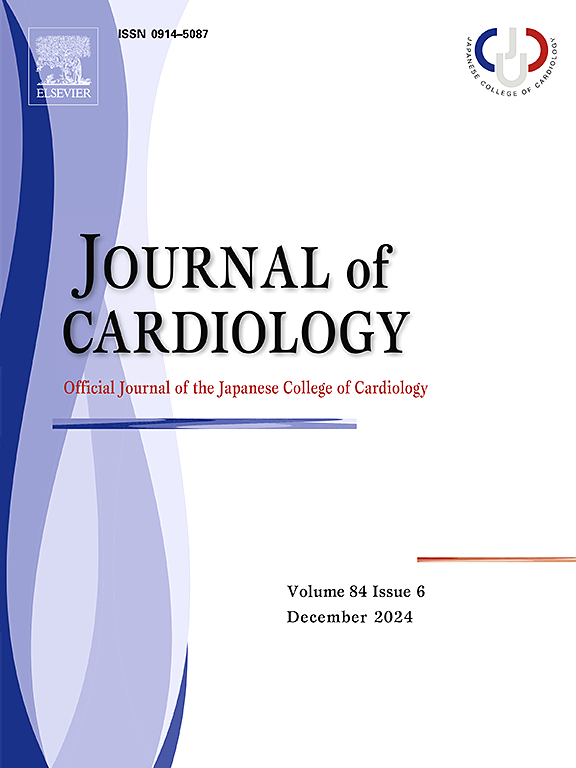The impact of liver cirrhosis on in-hospital outcomes among patients hospitalized for cardiogenic shock: A propensity score matched retrospective cohort study
IF 2.5
3区 医学
Q2 CARDIAC & CARDIOVASCULAR SYSTEMS
引用次数: 0
Abstract
Background
Cardiogenic shock poses a critical challenge characterized by diminished cardiac output and organ perfusion. Timely recognition and risk stratification are essential for effective intervention. Liver cirrhosis adds complexity due to its diverse systemic manifestations. The effect of liver cirrhosis on in-hospital outcomes in cardiogenic shock remains underexplored.
Methods
We conducted a retrospective cohort study using the National Inpatient Sample database from 2016 to 2020, matching cirrhotic patients with non-cirrhotic counterparts using propensity scores. The Cochran-Mantel-Haenszel method was used to assess the impact of cirrhosis on in-hospital mortality and complications. Simple linear regression models were used to assess differences in length of stay and cost of hospitalization.
Results
There were a total of 44,288 patients in the cohort, evenly distributed between the group with and without liver cirrhosis. Mean age of the cohort was 64 years (SD 12.5), 69.7 % were males, and 61.3 % were white. The overall in-hospital mortality rate in the cohort was 37.2 % with higher odds of in-hospital mortality in cirrhotic patients [OR = 1.3; 95 % CI (1.25, 1.35)]. Patients with cirrhosis exhibited increased risks of bowel ischemia, acute kidney injury, and sepsis compared to those without cirrhosis. Additionally, they had a heightened overall risk of major bleeding, particularly gastrointestinal bleeding, but a lower risk of intracranial hemorrhage and access site bleeding. Conversely, patients with cirrhosis had lower odds of deep vein thrombosis and pulmonary embolism, as well as arterial access site thrombosis and dissection, leading to reduced odds of peripheral angioplasty, thrombectomy, and amputation. Cirrhotic patients also had increased length of stay and cost of hospitalization.
Conclusion
Liver cirrhosis exacerbates outcomes in cardiogenic shock, necessitating tailored management strategies. Further research is warranted to optimize patient care and understand the underlying mechanisms.

肝硬化对心源性休克住院患者院内预后的影响:倾向评分匹配回顾性队列研究。
背景:心源性休克是一项严峻的挑战,其特点是心输出量和器官灌注减少。及时识别和风险分层对有效干预至关重要。肝硬化的全身表现多种多样,增加了其复杂性。肝硬化对心源性休克院内预后的影响仍未得到充分探讨:我们利用 2016 年至 2020 年全国住院患者抽样数据库进行了一项回顾性队列研究,利用倾向评分将肝硬化患者与非肝硬化患者进行匹配。采用Cochran-Mantel-Haenszel方法评估肝硬化对院内死亡率和并发症的影响。简单线性回归模型用于评估住院时间和住院费用的差异:组群中共有 44,288 名患者,肝硬化和非肝硬化患者平均分布在组群中。组群的平均年龄为 64 岁(SD 12.5),69.7% 为男性,61.3% 为白人。组群的总体院内死亡率为37.2%,肝硬化患者的院内死亡率较高[OR = 1.3; 95 % CI (1.25, 1.35)]。与非肝硬化患者相比,肝硬化患者发生肠缺血、急性肾损伤和败血症的风险更高。此外,他们发生大出血,尤其是消化道出血的总体风险较高,但颅内出血和入路部位出血的风险较低。相反,肝硬化患者发生深静脉血栓和肺栓塞以及动脉通路部位血栓和夹层的几率较低,从而降低了外周血管成形术、血栓切除术和截肢的几率。肝硬化患者的住院时间和住院费用也有所增加:结论:肝硬化会加重心源性休克的预后,因此必须采取针对性的管理策略。为优化患者护理并了解其潜在机制,有必要开展进一步研究。
本文章由计算机程序翻译,如有差异,请以英文原文为准。
求助全文
约1分钟内获得全文
求助全文
来源期刊

Journal of cardiology
CARDIAC & CARDIOVASCULAR SYSTEMS-
CiteScore
4.90
自引率
8.00%
发文量
202
审稿时长
29 days
期刊介绍:
The official journal of the Japanese College of Cardiology is an international, English language, peer-reviewed journal publishing the latest findings in cardiovascular medicine. Journal of Cardiology (JC) aims to publish the highest-quality material covering original basic and clinical research on all aspects of cardiovascular disease. Topics covered include ischemic heart disease, cardiomyopathy, valvular heart disease, vascular disease, hypertension, arrhythmia, congenital heart disease, pharmacological and non-pharmacological treatment, new diagnostic techniques, and cardiovascular imaging. JC also publishes a selection of review articles, clinical trials, short communications, and important messages and letters to the editor.
 求助内容:
求助内容: 应助结果提醒方式:
应助结果提醒方式:


